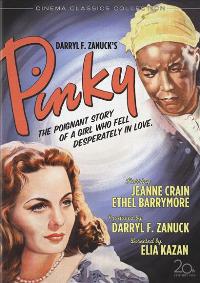
Pinky
The sinister role that skin color plays in a society that
limits its perception to it is undoubtedly highlighted in films such as
“Pinky”. Exploring the experiences of a
black woman so light that she passes for white forces one to really examine
definitions of race and the rigidity of perception in a racially biased
environment. Patricia “Pinky” Johnson
played by Jeanne Crain, returns to the “Deep South” under Jim Crow laws after
graduating from nursing school in Boston.
While in Boston, she lived life as a white woman. She returns to the South because she has, as
she says: “nowhere else to go.”
Her
return is heralded as good news. The
local black community is happy about her arrival because she would be a great
asset to the community due to her medical training. Her grandmother is expecting her to continue
the family tradition of servitude by providing bed-side care to old, dying Miss
Em., and a local black doctor is soliciting her to start a nursing school to
help provide education and training to the young black women of the community
who are high school graduates.
“Pinky”
is conflicted and disgusted by what she has to face. Her grandmother is still providing
washer-woman services to the aging and dying Miss Em., who no longer has any
money to provide any pittance to her servant.
Everyone in town suspects her of “passing” for white “up yonder” and she
is constantly being admonished to stay true to who she is and not deny being
black. This provides an undeniable
conflict for the character because who she is, is a woman who looks white. She has frequent and intense arguments with
her grandmother where she declares that she has been treated like an “equal” in
Boston and does not want to accept the low-class status that she is being
forced into in the South. “Pinky”
determines to leave, however she reluctantly stays out of reverence for her
grandmother’s request.
“Pinky”
bristles at having to accept a servile position. She has several venom-filled exchanges with Miss
Em. while tending to her. She demands
that Miss Em. respect her due to her training as a nurse. She fights back against Miss Em.’s subtle
accusations of theft, her domineering tone of voice and her requests that she
perform servile tasks.
“Pinky’s”
past finally comes back to haunt her.
Her white boyfriend that she had in Boston comes looking for her after
receiving a mysterious telegram about her, confirming to her grandmother that
she was living a lie in Boston. She
confesses to her boyfriend that she is really black. They reconcile and make plans to be reunited
and marry after she finishes working for Miss Em.
In
one very illuminative scene, the viewer truly catches a glimpse of the thin
racial line that the character has to walk, and is exposed to the strong
enticement that the character faces to pass for white. “Pinky” walks into a fabric store and is
immediately waited upon by a white sales woman.
She is shown the best fabric that the store has. Her money is accepted for payment until it is
pointed out by another white patron that she is actually “colored”. Instantly, she is transported into second-class
status and is ganged up on by the patron, the sales woman and the shop owner
and is accused of having stolen the money she is using to pay for the fabric.
The
film toned down the harshness of racism in the “Deep South”. Things turned out surprisingly “well” for the
young black woman who looks white. She
is made heir to her grandmother’s “employer’s” property and is victorious over Miss
Em.’s legal relatives in court as they fight over her will, a rare experience
for blacks in the “Deep South”. Due to
the white woman’s benevolent bequeathal, the black community is provided with
a nursing training center, hospital and nursery in the home of a former slave
owner. “Pinky’s” boyfriend, played by
William Lundigan is surprisingly understanding of being lied to and deceived by
his black lover and still wants to marry her and keep their racial differences
a secret.
“Pinky’s”
grandmother, Dicey Johnson is played by Ethel Waters who does an excellent job
of portraying the servile, worshipful mentality of many blacks who worked for
whites. She encourages her granddaughter
to stay and work for the family’s owner, even though she sent her away to school
in order to improve her station in life.
She relishes any scrap she receives from her owner. She is “proud” to be left with her deceased
owners clothes and does not complain about working for no pay.
“Pinky”
was a bold piece for the time it was made in 1949. It shattered many societal taboos and was
banned in some areas of the country for its “suggestive influence”. Some objected to the onscreen portrayal of
miscegenation and for some uncomfortable sexual situations. The movie director Elia Kazan had a strong
history of making movies that tugged at the social fabric of society. “Pinky” was Elias second film and was one of
the first films in America to address racism against blacks. The film does a wonderful job of bringing
society face to face with the juxtaposed lives of whites and blacks in
America. It provides an artful and
palatable way for the larger society to face its demons. “Pinky” is a thought provoking, classic movie
whose themes are still relevant to society today. In a society still struggling with
inter-racial unions, legal justice for blacks and providing a level playing
field for all its members of society, a contemporary review of this movie’s
themes would be a relevant, useful and welcome commentary.
Published: www.democracychronicles.com/pinky-skin-color-identity
Published: www.democracychronicles.com/pinky-skin-color-identity
No comments:
Post a Comment